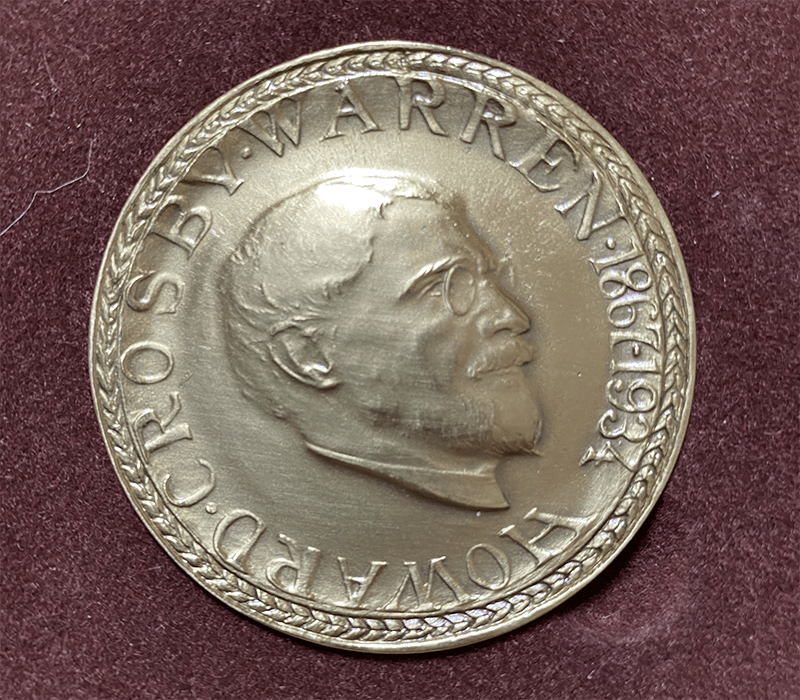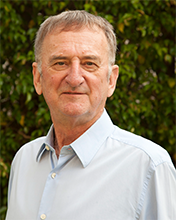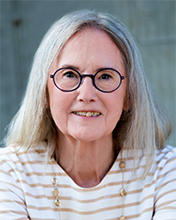2022
Awards

2022 Howard Crosby Warren Medal
Keith Holyoak, University of California, Los Angeles
Citation: “for his work on how people learn and use abstract relations that depend on the abstract similarity of the entities they relate—relations of the sort required to grasp social regulations, moral principles, causality, and analogies.”
 Holyoak pioneered a paradigm to study creative thinking, “planting” a potential source analog and then assessing when or if participants would use a solution suggested in the story to solve an ostensibly unrelated (but analogous) target problem. Analogical transfer, though rare, can be greatly enhanced by comparing multiple source analogs, thereby creating a more abstract schema for a class of problems (Gick & Holyoak, 1983; Catrambone & Holyoak, 1989. It can also be augmented by instructions to compare and/or contrast multiple examples. This educational tool has been used to teach students important relational schemas in many contexts, including math, science, and business negotiations.
Holyoak pioneered a paradigm to study creative thinking, “planting” a potential source analog and then assessing when or if participants would use a solution suggested in the story to solve an ostensibly unrelated (but analogous) target problem. Analogical transfer, though rare, can be greatly enhanced by comparing multiple source analogs, thereby creating a more abstract schema for a class of problems (Gick & Holyoak, 1983; Catrambone & Holyoak, 1989. It can also be augmented by instructions to compare and/or contrast multiple examples. This educational tool has been used to teach students important relational schemas in many contexts, including math, science, and business negotiations.
The idea that relational schemas facilitate everyday reasoning about novel situations led Cheng and Holyoak (1985) to develop the idea of pragmatic reasoning schemas. In this view, human inference is guided by rules that are neither fully abstract nor tied to specific cases, but rather are defined in terms of broad classes of situations linked to recurring social goals (e.g., checking that a precondition is satisfied before taking a restricted action). Training in terms of pragmatic schemas can further enhance reasoning performance (Cheng, Holyoak, Nisbett & Oliver, 1986). More recently, Holyoak and Powell (2016) applied the framework of pragmatic schemas as part of an account of everyday moral reasoning.
Holyoak was among the earliest to investigate the neural basis of higher cognition, focusing on the substrates for relational thinking in the human brain. Working with Barbara Knowlton and others, Keith investigated relational reasoning both in patients suffering from Frontotemporal Lobar Degeneration and in neuroimaging studies with college students. Their work showed that regions within the rostrolateral prefrontal cortex are especially important in reasoning with multiple relations, with more posterior frontal subregions being involved in inhibitory control. Holyoak has created several computational models of analogical mapping, such as ACME (Analogical Constraint Mapping Engine), which instantiated a multiconstraint theory of analogy (Holyoak & Thagard, 1989) and LISA (Learning and Inference with Schemas and Analogies), which provided an integrated account of analog retrieval and mapping and also inference and schema induction (Hummel & Holyoak, 2003).
For his significant empirical, methodological, and conceptual contributions to the study of human cognition, the Society of Experimental Psychologists awards the 2022 Howard Crosby Warren Medal to Keith Holyoak.
2022 Norman Anderson Lifetime Achievement Award
Marcia Johnson, University of California, Berkeley
Citation: “for her work on human memory, its neural bases, and how it develops, ages and can go awry.”
 Marcia Johnson has made several groundbreaking contributions to our understanding of human memory and the experience of remembering. In 1981, she and Carol Raye published a seminal paper posing a fascinating question—how do we tell the difference between what we have imagined and what we have physically experienced? This “reality monitoring” perspective led to the Source Monitoring Framework (SMF; Johnson et al., 1993), which presented a coherent theory tying together evidence from an astonishing range of research areas, including “old-new recognition, indirect tests, eyewitness testimony, misattributed familiarity, cryptomnesia, and incorporation of fiction into fact. In the same paper Johnson introduced an updated taxonomy of basic cognitive processes — her “Multiple Entry Modular (MEM)” cognitive architecture.
Marcia Johnson has made several groundbreaking contributions to our understanding of human memory and the experience of remembering. In 1981, she and Carol Raye published a seminal paper posing a fascinating question—how do we tell the difference between what we have imagined and what we have physically experienced? This “reality monitoring” perspective led to the Source Monitoring Framework (SMF; Johnson et al., 1993), which presented a coherent theory tying together evidence from an astonishing range of research areas, including “old-new recognition, indirect tests, eyewitness testimony, misattributed familiarity, cryptomnesia, and incorporation of fiction into fact. In the same paper Johnson introduced an updated taxonomy of basic cognitive processes — her “Multiple Entry Modular (MEM)” cognitive architecture.
Johnson’s key insight in this work was the recognition that accurate remembering isn’t just about assessing the strength of a memory signal—it requires a reflective, attention-demanding process of sorting through different sources of information from different brain networks. She noted that when we focus on the wrong sources, or when we fail to engage these memory monitoring processes, we can misremember the past. In the most extreme cases, failures of source monitoring can lead to vivid recollections of events that never took place.
Years after, using PET and fMRI, the Johnson Lab and other groups began to map the neural circuits involved in human memory. These studies highlighted the important role of the prefrontal cortex in implementing the memory monitoring processes central to Johnson’s thinking over the decades, even during mundane memory decisions.
Johnson’s ambitious research framework, applied to the study of memory across the lifespan, has informed our clinical understanding of memory processes in patients with amnesia, alcoholism, and brain diseases across a broad range of subdisciplines including cognitive, developmental, social, affective, and clinical neuroscience.
For her significant empirical, methodological, and conceptual contributions to the study of human memory, the Society of Experimental Psychologists awards the 2022 Norman Anderson Lifetime Achievement Award to Marcia Johnson.
